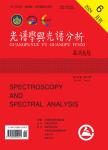Coniferous Canopy BRF Simulation Based on 3-D Realistic Scene
Coniferous Canopy BRF Simulation Based on 3-D Realistic Scene作者机构:Key Lab for Restoration and Reconstruction of Degraded Ecosystem in North-Western China ofMinistry of Education Ningxia University Yinchuan 750021 China Institute of Remote Sensing Applications Chinese Academy of Sciences Beijing 100101 China SSAI/NASA GSFC Greenbelt MD 20771 USA Department of Geography University of Maryland MD 20742 USA
出 版 物:《光谱学与光谱分析》 (Spectroscopy and Spectral Analysis)
年 卷 期:2011年第31卷第9期
页 面:2495-2498页
核心收录:
学科分类:083002[工学-环境工程] 0830[工学-环境科学与工程(可授工学、理学、农学学位)] 08[工学] 09[农学] 0804[工学-仪器科学与技术] 0903[农学-农业资源与环境] 0816[工学-测绘科学与技术] 081602[工学-摄影测量与遥感] 081102[工学-检测技术与自动化装置] 0811[工学-控制科学与工程]
基 金:the Chinese National Natural Science Foundation Project(40701124) the Chinese Hi-tech Research and Development Program Project(2006AA12Z114)
摘 要:It is difficulties for the computer simulation method to study radiation regime at *** coniferous model was investigated in the present *** makes the computer simulation methods such as L-systems and radiosity-graphics combined method(RGM) more powerful in remote sensing of heterogeneous coniferous forests over a large-scale region.L-systems is applied to render 3-D coniferous forest scenarios,and RGM model was used to calculate BRF(bidirectional reflectance factor) in visible and near-infrared *** in this study show that in most cases both agreed *** at a tree and forest level,the results are also good.



